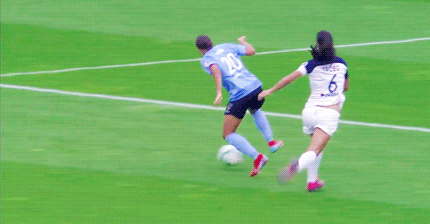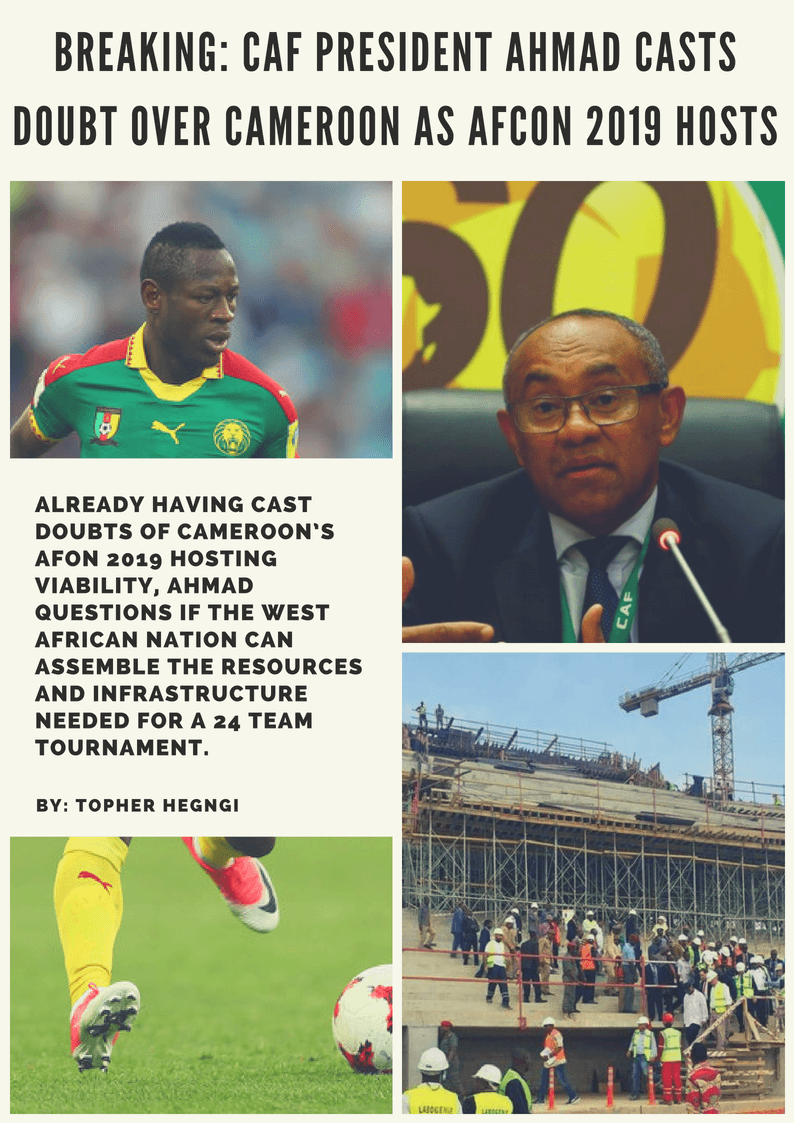
NEWS
A selection of FirstTouch's best football writing, brought to you by emerging journalists, collaborators, and fans.
CAF President Ahmad Questions Cameroon's Ability to host AFCON 2019
Already having cast doubts of Cameroon’s AFON 2019 hosting viability, Ahmad questions if the West African nation can assemble the resources and infrastructure needed for a 24 team tournament.
More doubt has been cast by the Confederation of African Football over Cameroon’s ability to host next year’s Africa Cup of Nations, with CAF President Ahmad Ahmad raising the possibility that the tournament may be moved.
This isn’t the first time President Ahmad has expressed doubt in Cameroon’s ability to hold AFCON 2019. With the Confederation of African Football’s decision to expand the tournament from 16 to 24 teams made back in July 2017, the demand for up to snuff infrastructure has been a source of increased tension between the federation and host nation.
After an inspection in February, CAF President Ahmad Ahmad urged Cameroon to improve their efforts to convince the federation of their viability as hosts after the inspection revealed that preparations were behind schedule.
CAF President Ahmad Ahmad AFP/Getty Images
Now a year after challenging Cameroon to prove they can host AFCON, taking place between June 7th and 30th 2019, President Ahmad has once again raised the possibility that the tournament could be moved.
"I am not sure Cameroon is ready to host the AFCON," he told KweséESPN. "There are many things which are still wanting and yet there is little time left.
"It would be dangerous to risk African players, especially the professionals plying their trade in Europe and other continents, to play under difficult conditions and facilities."
It must be said that there seems to be a small fount of pressure coming from the Royal Moroccan Football Federation’s official offer to support Cameroon’s hosting efforts. Even though in March, Fouzi Lekjaa, the Royal Moroccan Football Federation President, moved to end speculation regarding next year's AFCON during a press conference during the ongoing CAF Women's Football Symposium, let’s think about it from CAF’s perspective for a second.
With less than a year until AFCON 2019, to express doubt in a nation’s preparations suggests the federation may have contingencies to fall back on. Even though Morocco was eventually looked over by FIFA in their selection of North America as World Cup 2026 hosts, they proved during that process that they had the resources and infrastructure to ensure the potential of a positive, professional, and safe experience for the players and fans alike on that scale.
Dieudonne Happi, the chairman of the Normalisation Committee appointed to run the Cameroonian Football Association said it was a historical moment to see that Morocco is ready to come in and help them stage the biennial tournament.
““There must be no more of the rumours that have been circulating for some time,” he added. “The relationship between the governments of Morocco and Cameroon have come a long way.”
FECAFOOT holding a press conference in Cameroon addressing AFCON preparation.
"This is real brotherhood because the governments of the two countries have always been close," added the FECAFOOT chief. "This puts an end to all rumours. There is no way we can fail to help each other."
In addition to the indirect pressure for Morocco, CAF President Ahmad further expressed the possibility of the tournament being moved by urging Cameroon to be ready.
"If you are not ready, come out open and say you are not ready," Ahmad urged, but will be ready next time.
"In 1996, Burkina Faso was supposed to host the AFCON but said they were not ready, and South Africa took up the chance to host."
Should Cameroon retain the 2019 event, it’ll be the first time they've hosted AFCON since the 1972 edition, which was won by the Republic of Congo after defeating Mali 3-2 in the final.
CAF Afcon inspection committee in Cameroon/Journal Du Cameroon
"If you asked me”, President Ahmad added,” Cameroon would be the best country to host the AFCON now because of their football history, but there are still some questions about their readiness to host a successful tournament.
"Cameroon are still having big problems with infrastructure like the pitches and even hotels," added Ahmad. "Equatorial Guinea jumped in at the last moment to host 2015 AFCON and this can also happen."
The CAF are expected to officially pronounce whether or not Cameroon will retain their hosting rights during the CAF Extraordinary General Assembly to be held on September 30 in Sharm El Sheikh, Egypt. We wait with bated breath.
African Football 101: FirstTouch’s 8 points
This blog aims to provide insight on the landscape of football in Africa through the eyes of an African. It touches on eight key points that explain the state of African football targeted at those without enough exposure of what the beautiful game means to Africa.
Introduction
Nwako Kanu, Didier Drogba, Samuel Eto’o, Yaya Toure, George Weah, Samuel Kuffor and now Mohamed Salah – these are some of the big name African footballers who have illuminated Europe’s top domestic leagues. But with so many dazzling stars over the years, what does football on the African continent really look like? Do they have leagues, transfer windows? Are there any more Sadio Mane’s that some clubs could benefit from? How do Africans and the world see their football? Well, the list of questions goes on but here is one perspective from an African.
A.It all begins with a rubbish ball
Old newspapers, plastics, string, foam rubber and a touch of fire are all the right ingredients that make a soccer ball. In the streets of Harare, kids barely five years old scan through rubbish dumps to collect materials to make their own soccer balls either because their parents cannot afford a real one or that it would smash windows when they play in the streets. That’s where stars are first made, in the tiny tarred roads separating homesteads, battling it out barefooted. Fast forward a few more years and then the kids are old enough to play in dust community football pitches or at school where they soon become town celebrities. This is largely the narrative, not only in Harare but most parts of Africa. They are not a lot of fancy football academies there.
B. Club football
Probably 1 in maybe 1000 talented footballers actually end up playing for the local clubs. Most of them are lost in the system of “get good grades to get a job,” a popular slogan of risk averse parents. But who would blame them, as most of the domestic football leagues are poorly funded and dominated not by young talent but more mature “talent” looking to fend for their families.
For those few who actually make it, there is a bit of silver lining in some leagues. For example, the South African Premier League (PSL) which is fast becoming a powerhouse. It ships players mainly from Zimbabwe, Nigeria and many other African countries because in reality, other countries seem to host better talent than them. They do have a footballing calendar closely aligned to that in Europe and transfer windows where millions of rands are spent. But for a long time, club football on the continent has been dominated by North African clubs such as Al Ahly and Zamalek.
It is in some of these football leagues, where the Mo Salahs or George Weahs are first spotted and find themselves living the dream in Europe. There is another route where affluent parents send their children to academies abroad or that the families relocate and the kids found themselves growing up in foreign countries and pursuing the dream. This is the case of Alex Iwobi, the Nigerian and Arsenal youngster who grew up in England, Delle Alli (a Nigerian adopted by English parents), Mario Balotelli and many more.
C. Internationals
Like anywhere else in the world, when nations clash, its mostly about the bragging rights. Over the years, Africa has been dominated by West Africans such as Nigeria, Ghana, Senegal, Mali and Ivory Coast. They are known for their huge physicality while North Africans who consistently rank hire boast of some scintillating passing football, probably because they are close to countries like France and Spain. But all this is slowly changing, physical or scintillating football is coming from anywhere, it all depends on who is coaching the team especially now when most African teams employ coaches from outside the continent.
In terms of performances on global tournaments like the World Cup, because of the talent both at home and abroad, Africans should be doing more. But usually, inconsistent showings are earmarked by stories of low or non-payment of allowances and lack of insurance for players.
The nicknames of most national teams are as fierce as they come, Indomitable Lions of Cameroon, Super Eagles of Nigeria, Lions of Terranga (Senegal), Warriors of Zimbabwe, Lions of the Atlas (Morrocco), Desert foxes (Algeria), Copper Bullets of Zambia, the list is endless. What a powerhouse of names!







